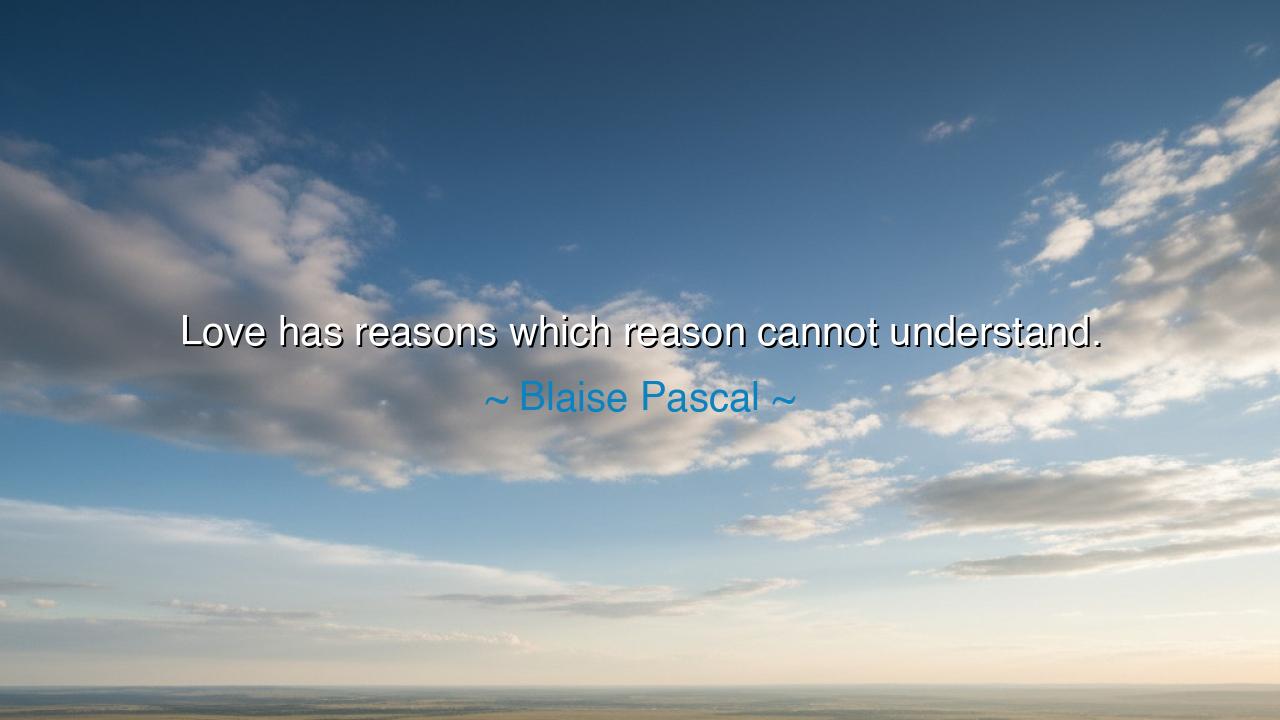
Love has reasons which reason cannot understand.






When Blaise Pascal declared, “Love has reasons which reason cannot understand,” he revealed one of the deepest paradoxes of the human soul — that the heart operates by a logic far greater than the mind. Pascal, a philosopher, scientist, and theologian, was a man of immense intellect, yet he also knew the limitations of intellect. He could measure the stars, study the heavens, and explore the laws of nature, but he recognized that love belonged to a realm beyond calculation. To love is not to analyze; it is to surrender. To love is to act on truths that reason cannot fully explain — truths that belong to the divine.
In his time, Pascal sought to reconcile the world of faith and reason, of the measurable and the mysterious. His famous Pensées — a collection of spiritual reflections — was born from this tension. He saw that the heart, in its simplicity, often perceives what the intellect misses. Thus, when he wrote that “love has reasons which reason cannot understand,” he was not speaking only of romantic love, but of all forms of love — divine, filial, fraternal, and compassionate. He meant that love is an act of intuition, not logic; of spirit, not strategy. It is the invisible force that moves the world forward, even when all rational arguments say it should not.
Indeed, reason can explain attraction, compatibility, and desire — but it cannot explain devotion. It cannot explain why a mother runs into a burning building for her child, or why a man forgives the one who betrayed him. It cannot explain why saints give up their lives for strangers, or why people continue to love after heartbreak. These are the mysteries that Pascal saw as the fingerprints of God upon the human heart. Love transcends reason because it is born from something infinite within us. It is both the greatest folly and the highest wisdom — foolish to the mind, but divine to the soul.
History gives us countless witnesses to this truth. Consider Antoine de Saint-Exupéry, the pilot and author of The Little Prince. During the Second World War, he risked his life again and again to fly reconnaissance missions, though he could have lived safely as a celebrated writer. When asked why, he answered that he could not abandon his countrymen, that his heart would not let him live in comfort while others suffered. It was not reason that guided him, but love — love for his people, for honor, for humanity. He died for a cause that logic could not justify, yet in doing so, he entered eternity’s embrace.
Or think of Mahatma Gandhi, who faced an empire with nothing but peace. Reason told him that nonviolence could never conquer the sword. Yet love — for truth, for justice, for his fellow man — gave him the strength to persist. His love for his enemies disarmed them more powerfully than any weapon. His victory was proof that love, though irrational in the eyes of the world, is the highest form of wisdom known to heaven. So it has always been: the great souls of history have acted not because logic compelled them, but because love called them.
To live by Pascal’s wisdom is to understand that reason is a tool, but love is a compass. The mind can guide us to safety, but only the heart can lead us to greatness. When love moves us, we enter the divine mystery where self fades and purpose awakens. This does not mean we should abandon reason, but rather that we must let love illuminate it. For reason without love becomes cruelty, and love without reason becomes chaos. Together, they form the balance of a full and awakened life.
So, my child, remember this sacred truth: love will often defy logic — follow it anyway. When your heart tells you to forgive, even when the world calls you foolish, forgive. When your heart tells you to risk everything for something beautiful, risk it. Love is the language of eternity, and reason is but the dialect of the present. Let your reason serve your heart, and not the other way around.
Thus, as Blaise Pascal teaches, “Love has reasons which reason cannot understand.” It is the most divine of paradoxes — that the wisest act is often the one reason cannot explain. For love is not a calculation; it is creation itself — the heartbeat of God within the human soul. Those who follow its call walk not by sight, but by light. And though the path may seem foolish to the world, it leads always toward truth, toward beauty, and toward eternity.






AAdministratorAdministrator
Welcome, honored guests. Please leave a comment, we will respond soon